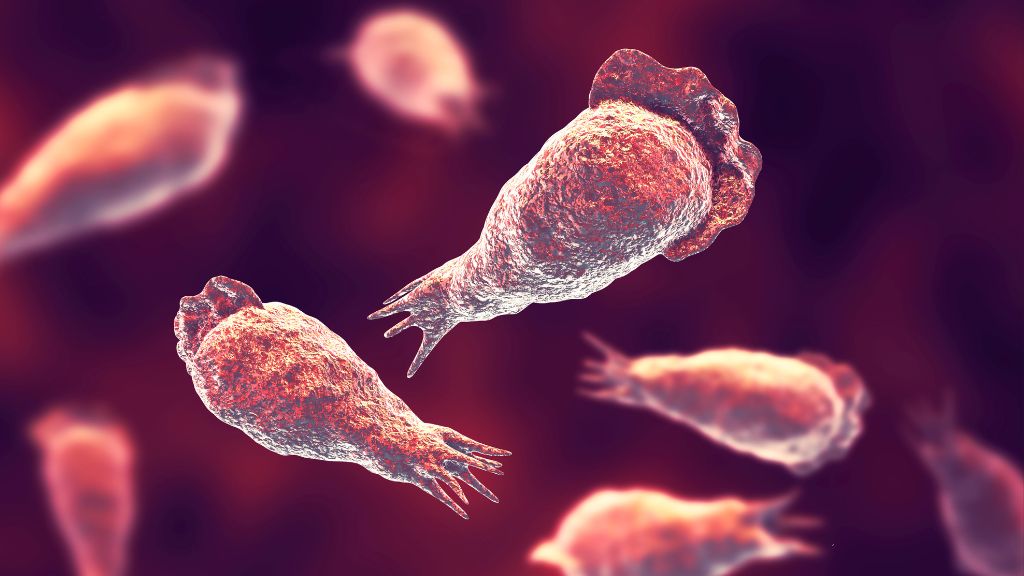'Brain-eating' amoeba case in Florida potentially tied to unfiltered water in sinus rinse
A person in Charlotte County, Florida caught a rare "brain-eating" infection.

A person in Charlotte County, Florida, was recently sickened by a single-celled organism that can cause a rare, "brain-eating infection," possibly as a result of rinsing their sinuses with unfiltered tap water, health officials reported. No information was provided on the person's condition, but the infection is typically fatal.
The organism, an amoeba called Naegleria fowleri, typically lives in soil and warm fresh water and can sometimes grow in water tanks, heaters and pipes, according to the Centers for Disease Control and Prevention (CDC). In rare instances, it can infiltrate the human body and cause a disease of the brain and spinal cord called primary amebic meningoencephalitis (PAM), the CDC says. People can't develop PAM by swallowing N. fowleri or by interacting with an already-infected person; rather, the amoeba enters the brain through the nose, by traveling through the nerve that relays information about smells from the nose to the brain.
Symptoms of the infection emerge between one and 12 days after N. fowleri enters the nose, and the infection is almost always fatal — people typically die one to 18 days after symptoms begin.
On Thursday (Feb. 23), the Florida Department of Health in Charlotte County (DOH-Charlotte) announced that it had confirmed a local case of N. fowleri infection, "possibly as a result of sinus rinse practices utilizing tap water."
Related: Fatal 'brain-eating' amoeba successfully treated with repurposed UTI drug
Regarding the use of neti pots and other sinus rinsing methods, the Food and Drug Administration warns that "Tap water isn't safe for use as a nasal rinse because it's not adequately filtered or treated." People should boil and cool tap water before using it for such purposes, or else pass it through a filter designed to trap infectious organisms; alternatively, distilled or sterile water is another safe choice, the agency notes.
"DOH-Charlotte, as part of a multi-agency response, is continuing to investigate how this infection occurred and is working with the local public utilities to identify any potential links and make any necessary corrective actions," the department stated.
Sign up for the Live Science daily newsletter now
Get the world’s most fascinating discoveries delivered straight to your inbox.
In addition, DOH-Charlotte included the following instructions for Charlotte County residents:
- When making sinus rinse solutions, use only distilled or sterile water. Tap water should be boiled for at least 1 minute and cooled before sinus rinsing.
- DO NOT allow water to go up your nose or sniff water into your nose when bathing, showering, washing your face, or swimming in small hard plastic/blow-up pools.
- DO NOT jump into or put your head under bathing water (bathtubs, small hard plastic/blow-up pools); walk or lower yourself in.
- DO NOT allow children to play unsupervised with hoses or sprinklers, as they may accidentally squirt water up their nose. Avoid Slip N Slides or other activities where it is difficult to prevent water going up the nose.
- Keep small hard plastic or blow-up pools clean by emptying, scrubbing and allowing them to dry after each use.
- Keep your swimming pool adequately disinfected before and during use.

Nicoletta Lanese is the health channel editor at Live Science and was previously a news editor and staff writer at the site. She holds a graduate certificate in science communication from UC Santa Cruz and degrees in neuroscience and dance from the University of Florida. Her work has appeared in The Scientist, Science News, the Mercury News, Mongabay and Stanford Medicine Magazine, among other outlets. Based in NYC, she also remains heavily involved in dance and performs in local choreographers' work.









